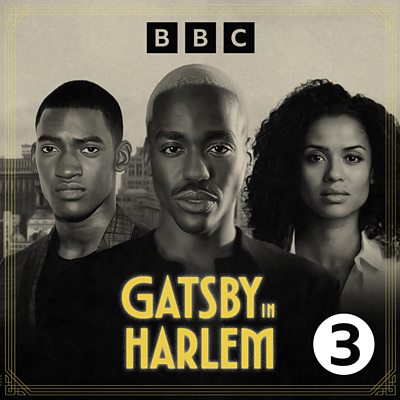Episode details

Available for over a year
Ncuti Gatwa, Gugu Mbatha-Raw and Malachi Kirby star in the award-winning playwright Roy Williams's тGatsby in Harlemт. A reimagination of F Scott Fitzgerald's The Great Gatsby. Harlem NYC, 1925. It is the time of one of the most creative cultural revolutions America has ever experienced. The Harlem Renaissance is up and running! Young Nick Carraway runs away from the racially segregated Jim Crow laws of the Deep South for a better life as an African American in New York City. He is reunited with his cousin Daisy and meets her domineering husband, uptight black businessman Tom Buchanan. Nick rents a ground-floor grubby apartment, right in the heart of Harlem. He resides next door next to the fanciest, as well as, largest Brownstone mansion on the block - owned by one Jay Gatsby, a mysterious black business magnate who often hosts extravagant all night jazz parties on every floor of his home. Gatsbyтs parties are the talk of Harlem! Set in an all-black neighbourhood with a heavy jazz score. This slightly reimagined take of the original classic, moves the location from Long Island, dominated by WASPS (White Anglo Saxon Protestants), to the pulsating, jazz-loving streets of African American Harlem. The Harlem Renaissance offered African Americans across the country a new spirit of self determination, pride and a belief in their own American Dream, that all Americans would one day be able live and be respected and accepted as one, living in a time when segregation becomes a thing of the past. Harlem is the perfect setting for a re-imagined world of The Great Gatsby. The 1920s Jazz Age, during which Fitzgerald's novel is set, overlaps directly with The Harlem Renaissance, a vibrant cultural and artistic movement. Both movements emphasised the transformative power of creativity, music (especially Jazz), and breaking free from societal norms. Gatsbyтs opulent parties, filled with Jazz and excess, align with the rise of Black culture and expression. Fitzgerald was also looking at reinvention, with Gatsby embodying the self-made man. Similarly Harlem represented a cultural reinvention for African Americans, a reclaiming of identity and a celebration of achievements in all areas of the arts and politics. Warning: This programme contains some historical racial language. The original theme music was composed and performed by Tomorrows Warriors, a company dedicated to inclusivity and diversity in jazz, fostering a culture of mentorship to talented young jazz musicians. This episode features an extract from тTo a Dead Friendт by Langston Hughes Credit List Nick Carraway - Malachi Kirby Jay Gatsby - Ncuti Gatwa Daisy Buchanan - Gugu Mbatha-Raw Tom Buchanan ChikУЉ Okonkwo Jordon Baker - Michaella Moore Myrtle Wilson - Harmony Rose Bremner Wilson - Ako Mitchell Stephanie St Claire - Moya Angela Dan Cody - Sam Dale Klipspringer - Tom Glenister Mr Greene - Joseph Mydell Other parts were played by Tom Alexander, Sam Dale, Tayla Kovacevic-Ebong, Vigs Otite, Finlay Paul and Romario Splatt Directed by Celia de Wolff Produced by Nathan Freeman and Tom Billington A Granny Eats Wolf production for УлбПДЋУН Radio 3 Executive Producers Tom Billington and Nathan Freeman Producer - Celia De Wolff Assistant Producer - Eleanor Mein Runner - Greg Birks Sound Design - Andreina Gomez Casanova and Axel KacoutiУЉ Dialogue editor and engineer - Matt Bainbridge. Additional editor - Lucinda Mason-Brown. Original music and composition - Emily Tran Music Supervisor - Ben Burrell Musical Director - Gary Crosby. Performers for Tomorrow Warriors: Gary Crosby and Tom Sheen on Bass Will Gibson on Sax and Clarinet Mark Kavuma on Trumpet Sarah Tandy on Piano And Rod Youngs on Drums Arrangements by Mark Kavuma and Emily Tran The producer for Tomorrowтs Warriors - Fish Krish Music sound-engineered, mixed and mastered by Luc Saint Martin All dialogue and music recorded at The Confetti Institute - London, part of Nottingham Trent University.
Programme Website